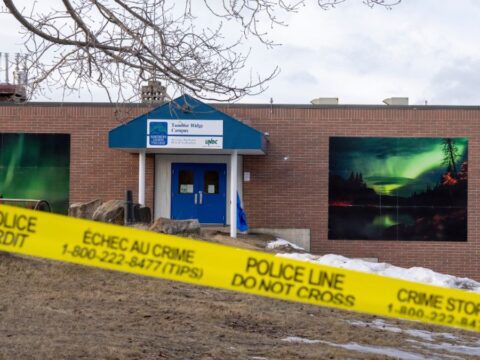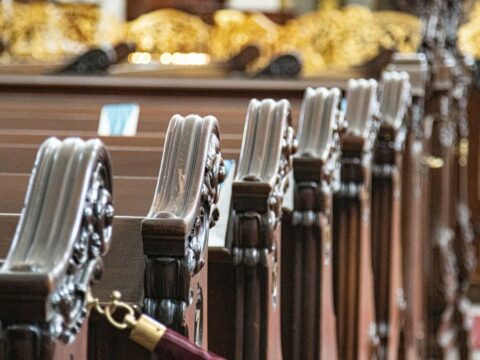Editor’s note: Forty years ago, David Mainse told Observer writer Muriel Duncan that Godhad given him an idea: a daily Christian television show for Canadians. Mainse was also convinced that God had led him to a building in Toronto where he could make the dream a reality. When the show began broadcasting in 1977, it took the name of the building: 100 Huntley Street. Episodes offered a lower-key version of Christian television south of the border, with interviews, testimonials, call-in prayer lines, the occasional healing miracle — and appeals for donations. Mainse escaped the scandals that later tarnished many U.S. televangelists. He retired in 2003, after spinning his dream into a Christian media conglomerate based in Burlington, Ont. Now 40 years old, 100 Huntley Street still airs weekday mornings on the Global Television Network, making it Canada’s longest-running weekday TV talk show. Mainse died on Sept. 25. He was 81 years old.
“God loves you and He will set you free . . . say yes to Jesus,” pleads David Mainse, leaning earnestly towards the television camera.
You may unsubscribe from any of our newsletters at any time.
David Mainse is host of the first seven-day-a-week Christian television program to originate in Canada. Mornings, Monday through Saturday, 100 Huntley Street is aired live for 90 minutes on Global Television Network; on Sundays it’s on at midnight.
Using a talk show format, Mr. Mainse, a minister of the Pentecostal Assemblies of Canada, works with a variety of co-hosts, interviewing guests about the power of God in their lives. While the show is on the air, volunteers man a bank of 30 telephones that bring direct response from viewers.
The show is almost over now, and David Mainse is thanking his guests and the musicians. “There’s such a lovely sense of the presence of God here,” he says. That’s really how Mr. Mainse explains all the good things that have happened to him and the production. “I firmly believe that God has been more interested in this program happening than we were – and don’t get me wrong, we were interested.”
Over and over again, since the idea came to him 12 years ago in a dream, David Mainse has found God’s hand directing this program. Take the building at 100 Huntley Street that is now the home for the show. Mr. Mainse thinks it is nothing short of miraculous that a building with its location (heart of Toronto) and facilities (perfect for conversion to a television studio) would come at a time it was needed (last winter) for a price within the budget ($100,000 a year rent on a 20-year-lease).
In the same way, he found experienced staff almost without looking for them, he says. One, Father Bob McDougall, a Jesuit priest, felt called by God while on a retreat in California.
Since June, 100 Huntley Street has been going out on the Global network, which covers the heavily populated area of southern Ontario from Windsor to Ottawa. Stations in the western provinces have shown interest in running the program on a syndicated basis, and the Huntley people are talking about eventual national coverage.
What you see on television is just part of the huge support staff at 100 Huntley. About 75 people are on the full and part-time staff, with many other volunteers who come in off and on to do work as they are needed. The building really houses Crossroads Christian Communications Inc., which also produces the weekly Crossroads program and the children’s program Circle Square. David Mainse, who has been in television for 15 years, initiated all three programs. His wife Norma-Jean produces the new show.
Back-up staff include an accounting department, ministers who follow up the telephone counselling done during the program, a music co-ordinator, computer operators, technicians and engineers, not to forget the people who run the kitchen and cafeteria that feeds not only the staff and volunteers but the daily studio audience of 100, who often come from out of town on bus tours.
As organized and smooth-running as it all appears, the show is not planned too far ahead. “I don’t know what happens next week,” Mr. Mainse says. “I’ve decided that if I had a five-year plan, the Devil would know what was in that plan.” Instead, Mr. Mainse feels it is safer to wait and see what is in God’s mind when the time comes. This relaxing and letting God look after things extends to finances, he says. The money to run the organization and pay the rent for the time period comes from individual contributions and some congregational gifts.
There haven’t been any surveys yet to determine how many people are watching the program. But in the first eight days of operation, just over 3,000 calls came in to the Huntley Street phones. Some people needed personal counselling, some prayer, some were looking for information, some for healing. Some wanted to commit their lives to Christ.
“There’s a trend back to God,” says David Mainse. “And wherever people are opening up to the Holy Spirit, it makes good television . . . things are happening.” He talks about healing that has been part of the show – the woman in the audience who took off her hearing aid — the healings that can happen over the phone “in faith-filled atmosphere.” Two of his own floor crew had healing experiences: one who’d been deaf in one ear since birth, the other who was suffering from a bad back.
There hasn’t been any official United Church involvement in this program, although Mr. Mainse insists that the show is non-denominational and expects to have United Church guests. A number of denominations are represented on staff by people who’ve come as individuals.
While many in the United Church may not feel comfortable with this kind of television evangelism, that doesn’t mean a lack of interest in using television to reach people.
In fact, the United Church has begun researching the television talk show format. The Division of Communication is basing its study on a “for instance” show that would run 60 minutes each week with hosts and guests who would talk from their personal experience as opposed to a documentary or social action approach.
The Rev. Keith Woollard who is working on the research project says people such as Oral Roberts, Rex Humbard and Billy Graham each spend about $6 million a year in their television operation. The United Church would be limiting its thinking to the $100,000 to $300,000 neighborhood. The Church would have to decide if it was a priority, he says.
While the hypothetical program would use the same talk show format and feature the same opportunity for listeners to phone in as 100 Huntley Street, Mr. Woollard sees definite differences in the way the United Church would approach such a program.
“If we were to go into it there would have to be a broader expression of Christian experience and involvement with the real world, whether in the inner person, or family or society,” he says. While he responds to many of the elements of 100 Huntley Street, Mr. Woolard feels it stops short of “looking hard at the full range of our society.”
This story originally appeared in the September 2016 issue of The Observer with the title “100 Huntley Street.”















I used to know one of your volunteers Juanita Keith a lovely Christian and I think a lot of 100 Huntley Street and a friend of mine got saved through 100 Huntley Street. You have a great ministry and I am so happy you are going on with the Lord in your broadcast. God certainly is using you. I am a Christian and used to be a Baptist but now a Pentecostal. God bless all of you.
Hundred Huntley Street has helped me and prayed with me through some very difficult times and I will be forever grateful ❤️